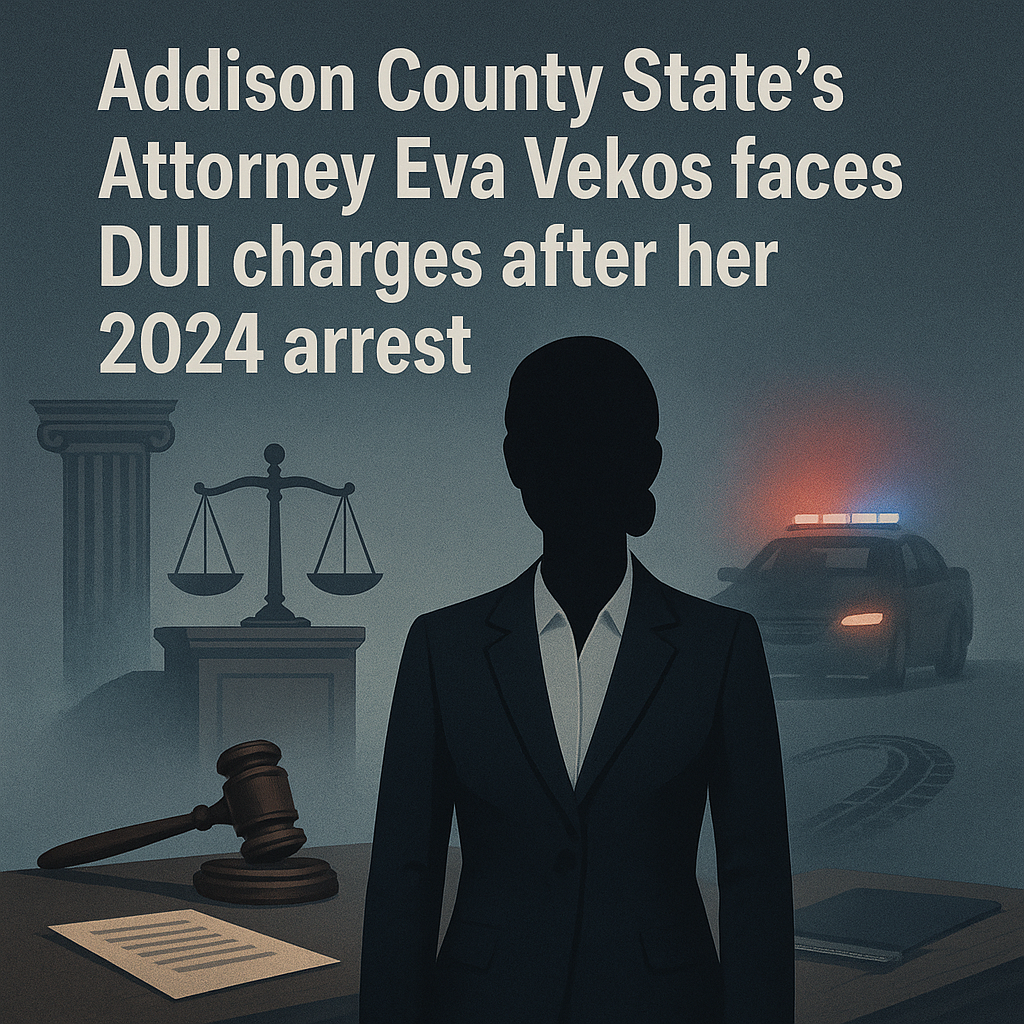Eva Vekos: Not Guilty Plea and Judicial Rejection of Dismissal Attempt in DUI Case
The DUI case against Addison County State’s Attorney Eva Vekos has taken several dramatic turns since her January 2024 arrest, highlighting the complex legal and ethical challenges that arise when prosecutors themselves face criminal charges. The case has progressed through multiple procedural battles, with defense attempts to dismiss the charges ultimately failing before a judge who found sufficient probable cause to proceed. The matter has attracted significant public attention given Vekos’s prominent role as the county’s top prosecutor and the circumstances surrounding her arrest at a homicide investigation scene.
Recent developments indicate that Vekos is now seeking to change her plea to no contest, potentially bringing the case toward resolution after months of legal wrangling. The proposed plea deal would result in a deferred sentence that could ultimately clear her record if she complies with probationary conditions, though the judge has requested additional information before making a final determination.
Arrest Circumstances and Initial Charges
Incident Details and Plea
Vekos was charged with DUI after state troopers said she drove to the scene of a homicide investigation intoxicated in January 2024, creating an immediate controversy given her position as the chief law enforcement official responsible for prosecuting criminal cases in Addison County. The arrest occurred when she arrived at a death investigation in Bridport, Vermont, where state police were already conducting their inquiry into what was initially classified as a suspicious death.
Vekos pleaded not guilty to the DUI charge following her arrest, initiating a legal process that would test the boundaries of prosecutorial accountability and highlight the procedural complexities of trying a sitting prosecutor. Her not guilty plea set the stage for what appeared to be a contested trial where the evidence and circumstances of her arrest would be examined in detail.
The timing and location of the arrest added layers of complication to the case, as questions arose about whether Vekos’s role as state’s attorney influenced how troopers handled the situation and whether her presence at an active crime scene while allegedly intoxicated created additional concerns about professional judgment and ethical responsibilities.
Evidence Raised by the State
State troopers noted a smell of intoxicants and slurred speech when they encountered Vekos at the death investigation scene, observations that formed the foundation of their probable cause determination for the DUI arrest. These initial observations by the arresting officers created the evidentiary basis that prosecutors would later rely upon to justify the charges and resist defense efforts to dismiss the case.
Vekos admitted to drinking a gin and tonic and refused to take field sobriety tests or submit to a breathalyzer examination, decisions that are legally permissible but often interpreted by prosecutors and judges as indicators of consciousness of guilt. Her refusal to submit to testing eliminated the most direct forms of evidence that typically establish intoxication levels in DUI cases, shifting the evidentiary focus to observational indicators and circumstantial evidence.
The officers’ recordings of the arrest would later become significant evidence in the case, with defense attorneys arguing that the videos showed Vekos displaying normal cognitive function and physical coordination rather than the impairment typically associated with intoxication. The defense characterized her demeanor on the recordings as that of “a woman completely in control of her undiminished mental and physical capacities.”
Attempted Influence
Vekos reportedly asked the troopers to use their “discretion” or allow her to call a friend to pick her up rather than proceeding with an arrest, statements that could be interpreted as attempts to leverage her position as state’s attorney to receive preferential treatment. These requests raised ethical concerns about whether prosecutors should receive special consideration when they themselves face potential criminal liability.
The nature of these interactions highlighted the inherent conflicts that arise when prosecutors become defendants, as relationships with law enforcement officers and understanding of criminal justice processes create dynamics that differ substantially from typical defendant experiences. The requests for discretionary treatment, while perhaps understandable given the professional consequences of a DUI arrest for a sitting prosecutor, created perception problems regarding equal application of justice.
Legal Debate Over Probable Cause
Defense Arguments
Defense attorney Robert Sleigh argued that insufficient evidence existed to justify the DUI charge, challenging the foundational probable cause determination that allowed the prosecution to proceed. He emphasized that only two officers reported observing slurred speech and that no evidence indicated erratic driving behavior prior to her arrival at the scene.
The defense strategy focused on undermining the reliability and sufficiency of the officers’ observations, arguing that the evidence presented did not meet the legal threshold required for probable cause to believe Vekos was operating a vehicle while intoxicated. Sleigh’s arguments highlighted inconsistencies in officer observations and pointed to the absence of traditional DUI indicators like poor driving performance or failed field sobriety tests.
The defense also presented the arrest recordings as evidence contradicting the prosecution’s narrative, arguing that the videos showed Vekos displaying normal speech patterns, steady physical coordination, and clear cognitive function inconsistent with intoxication. This strategy attempted to create reasonable doubt about whether Vekos was actually impaired at the time of her arrest.
Judge Zonay’s Rejection of the Motion
The judge ruled that probable cause existed based on the “totality of circumstances,” applying a legal standard that considers all available evidence collectively rather than requiring any single piece of conclusive proof. This ruling represented a significant setback for the defense strategy of challenging the case’s foundational premises before proceeding to trial.
The factors cited by the judge in finding probable cause included the strong smell of alcohol, watery eyes, slurred speech, and admission of alcohol consumption, creating a constellation of indicators that collectively satisfied the probable cause standard despite the absence of more definitive evidence like breathalyzer results. The judge’s decision reflected the relatively low evidentiary threshold required for probable cause compared to the proof beyond reasonable doubt standard necessary for conviction.
The ruling meant that the case would proceed toward trial unless resolved through plea negotiations, eliminating the possibility of an early dismissal that would have allowed Vekos to avoid the professional and personal consequences associated with a DUI conviction or plea agreement.
Secondary Rulings and Jurisdictional Changes
Biometric Recording Dispute
The defense contested the prosecution’s request for fingerprints and photographs, citing Vekos’s lack of criminal history and arguing that such biometric collection was unnecessary and potentially punitive for a first-time misdemeanor DUI offense. This procedural battle reflected broader defense efforts to minimize the case’s impact on Vekos’s professional reputation and future prospects.
The defense argued that the prosecution had not demonstrated a legitimate law enforcement need for biometric data collection beyond what would normally be required in standard misdemeanor cases, suggesting that the request represented unnecessary intrusion or potentially retaliatory treatment because of Vekos’s position as a sitting prosecutor.
Judge’s Decision on Fingerprinting
The judge sided with the defense, determining that the prosecution had not demonstrated “good cause” for such an order in a minor misdemeanor case, representing one of the defense’s few procedural victories in the case’s early stages. This ruling acknowledged that first-time DUI offenses typically do not warrant the kind of extensive biometric data collection more commonly associated with serious felonies or repeat offenders.
The decision reflected judicial recognition that procedural requirements should be proportionate to offense severity and that prosecutors must justify departures from standard practices rather than simply demanding enhanced measures because of a defendant’s high profile or professional position.
Case Transfer
The judge transferred the case to Chittenden County to avoid potential conflicts of interest, recognizing that Vekos’s role as Addison County State’s Attorney created untenable conflicts if the case remained within her normal jurisdictional authority. This transfer represented standard practice when prosecutors face criminal charges, ensuring that the case would be handled by attorneys and judges without professional or personal relationships to the defendant.
The jurisdictional transfer also addressed concerns about fairness and public perception, as having Vekos prosecuted within the county where she serves as the chief prosecutor would have created appearances of impropriety regardless of the actual fairness of proceedings. The Vermont Attorney General’s Office assumed prosecution responsibilities, providing the institutional separation necessary for legitimate proceedings.
Professional Consequences and Repercussions
Vekos’s Professional Status
Vekos was placed on leave following her arrest, removing her from active prosecution responsibilities while the criminal case proceeded. Cases previously assigned to Vekos were reassigned to other prosecutors in the Addison County State’s Attorney’s Office, requiring significant case management adjustments to ensure that ongoing prosecutions continued without disruption.
The leave arrangement reflected the impossibility of Vekos continuing to prosecute criminal cases while herself facing criminal charges, as her credibility as a prosecutor would be fatally compromised in any courtroom appearance. The situation created operational challenges for the Addison County prosecutor’s office, which had to redistribute significant caseloads among remaining staff members.
However, Vekos has since returned to work as Addison County State’s Attorney while still facing the pending DUI charge, a decision that has drawn criticism from some quarters about whether prosecutors facing criminal charges should resume their duties before their own cases are resolved. Her return to work suggests confidence in either the eventual resolution of her case or a determination that the charges should not preclude her from fulfilling her elected duties.
Professional Context
Vekos was elected to her first four-year term in November 2022, meaning that the DUI arrest occurred relatively early in her tenure as Addison County State’s Attorney. This timing created additional complications, as a newly elected prosecutor facing criminal charges raised questions about fitness for office that might have been viewed differently for a more established incumbent with a long track record.
The DUI charge carries a maximum penalty of two years in prison and a $750 fine upon conviction, though such maximum sentences are rarely imposed for first-time offenders without aggravating circumstances. The more significant consequence for Vekos involves the professional implications of a DUI conviction for a sitting prosecutor, including potential bar discipline, loss of public trust, and political vulnerability in future elections.
The proposed resolution involving a no contest plea and deferred sentence represents a relatively favorable outcome that would allow Vekos to avoid a permanent criminal conviction if she successfully completes the probationary period. Under this arrangement, the conviction would be expunged from her record after 90 days if she stays out of legal trouble, potentially minimizing the long-term professional consequences while still acknowledging some degree of responsibility for the incident.




